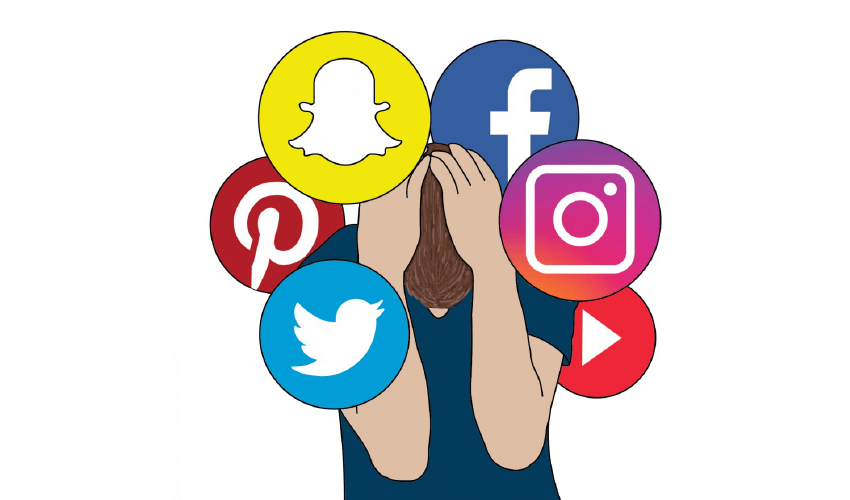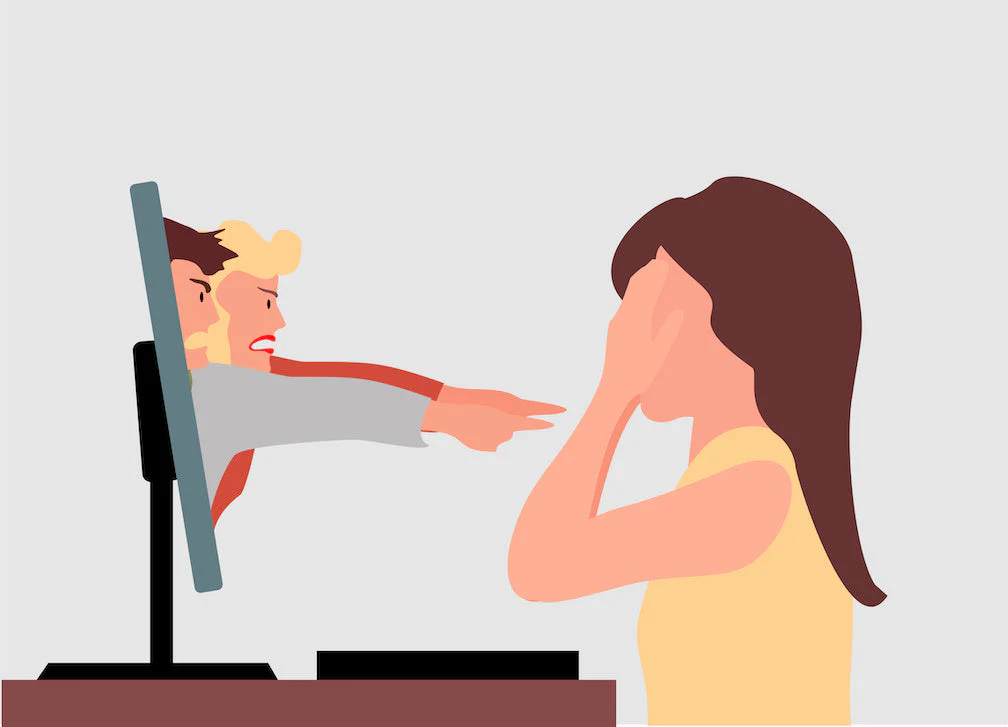Table of Contents

Introduction
The Impact of Social Media on Mental Health in today’s digital epoch, social media has become deeply embedded in the fabric of our daily lives. With platforms such as Facebook, Instagram, Twitter, and TikTok at our disposal, we are granted unprecedented opportunities to maintain connections with friends, disseminate personal experiences, and delve into an ocean of information with a mere swipe of our fingers. While the advantages of social media are undeniable, including the fostering of social connections and the dissemination of awareness regarding critical matters, there is a burgeoning concern about its potential detrimental effects on mental health.
As mental health practitioners, it is our imperative to navigate the intricate tapestry that connects social media and psychological well-being. This blog post is dedicated to dissecting both the positive and negative implications of social media on mental health, scrutinizing the factors that contribute to these effects, and elucidating strategies to cultivate a balanced and salutary approach to social media consumption.
The Positive Influence of Social Media on Mental Health
Before we immerse ourselves in the potential risks that social media poses to our mental health, it is essential to recognize the multifaceted benefits it can confer when used judiciously and with a clear intent.
Facilitating Social Connections and Counteracting Loneliness
Social media’s most profound boon is its capacity to connect individuals, transcending geographical barriers and enabling communication with friends, family members, and communities. For those grappling with social isolation or challenges in forming interpersonal relationships, these platforms can serve as a vital conduit for social interaction and support. Research has consistently demonstrated that leveraging social media to bolster existing relationships can engender a heightened sense of belonging and a significant reduction in loneliness. (The Impact of Social Media on Mental Health)
Providing Access to Support Networks and Mental Health Communities
The advent of social media has precipitated the emergence of numerous online communities and support groups dedicated to mental health. These digital sanctuaries offer solace to individuals wrestling with a spectrum of psychological issues, including depression, anxiety, eating disorders, and addiction. By connecting with like-minded individuals, users can access resources and share experiences that may be otherwise elusive within their immediate social circles. These communities can be a bastion of empathy, offering encouragement and practical advice to those navigating the tumultuous waters of mental distress.(The Impact of Social Media on Mental Health)
Catalyzing Self-Expression and Creativity
For many, social media platforms double as a canvas for artistic expression and a vehicle for showcasing personal talents. Whether through Instagram’s visual narratives or TikTok’s bite-sized videos, users revel in the opportunity to express themselves creatively. This form of self-expression can bolster self-confidence, instill a sense of purpose, and contribute to an individual’s holistic well-being. Furthermore, the act of crafting one’s online identity can be a cathartic process of self-exploration and identity formation, particularly for adolescents and young adults grappling with the complexities of their burgeoning selves.


Advancing Mental Health Awareness
Social media has become a veritable podium for mental health advocacy. Celebrities, influencers, and laypeople alike have harnessed the power of these platforms to disseminate their personal narratives, advocate for improved mental health resources, and champion candid dialogues surrounding mental health. This heightened visibility and destigmatization of mental health discourse can empower individuals to seek help, support their loved ones, and foster a society that is more empathetic and understanding.
The Dark Side of Social Media: Negative Impacts on Mental Health
While social media can be a bastion of positivity and connection, it is crucial to acknowledge its potential to exacerbate mental health issues, particularly among susceptible demographics such as adolescents and young adults.(The Impact of Social Media on Mental Health)
Elevated Risk of Depression and Anxiety
An extensive body of research has linked excessive social media use with an increased prevalence of depression and anxiety. The omnipresence of idealized depictions of life can precipitate a vicious cycle of social comparison, leaving users feeling desolate and inadequate. This can manifest in a multitude of ways, including exacerbated symptoms of depression, body image issues, and anxiety. Moreover, social media’s propensity to expose users to cyberbullying, negative interactions, and harmful content can significantly contribute to the deterioration of mental health.(The Impact of Social Media on Mental Health)
The Phenomenon of FOMO (Fear of Missing Out)
Another pervasive issue is the fear of missing out (FOMO), a psychological state characterized by the perception that others are leading more rewarding and exciting lives. This pervasive sense of inadequacy can fuel feelings of dissatisfaction and distress, leading to a vicious cycle of constant connectivity and validation-seeking behavior.(The Impact of Social Media on Mental Health)
Self-Esteem and Body Image Concerns
The deluge of images and content that promote unrealistic beauty and body standards on social media can take a toll on one’s self-esteem and body image. Adolescents and young adults are especially vulnerable to these pressures, as they are in the formative stages of their identity development. Exposure to these unattainable ideals can lead to negative body perceptions, low self-worth, and disordered eating patterns. Research published in the Journal of the American Academy of Child and Adolescent Psychiatry has established a clear correlation between increased social media consumption and the emergence of body image concerns among young females, often precipitating harmful eating behaviors.(The Impact of Social Media on Mental Health)
Addiction and Overuse
For a subset of individuals, social media can evolve from a harmless pastime into a compulsive behavior, interfering with their daily routines and relationships. The relentless pursuit of likes, comments, and messages can lead to a form of behavioral addiction that encroaches on sleep, concentration, and the quality of real-world interactions. The detrimental consequences of excessive social media use are manifold, ranging from impaired academic performance to diminished productivity and the neglect of crucial responsibilities.(The Impact of Social Media on Mental Health)


Factors Contributing to the Negative Impact
To effectively combat the negative repercussions of social media on mental health, it is imperative to dissect the underlying factors that contribute to its deleterious effects.(The Impact of Social Media on Mental Health)
Quantity of Time Spent on Social Media
The volume of time one dedicates to social media is a significant predictor of its impact on mental health. Studies have consistently shown that individuals who spend more than two hours per day on these platforms are at a greater risk of experiencing poor mental health, including symptoms of depression and anxiety. This excessive use can lead to a displacement of other vital activities, such as physical exercise, personal hygiene, and face-to-face social interactions, which are pivotal to mental well-being.(The Impact of Social Media on Mental Health)
Quality of Content Consumed
The nature of the content one engages with on social media can significantly influence its impact on mental health. Exposure to negative news, political discord, or idealized images can be particularly damaging. In contrast, active participation in discussions and the creation of content can be more beneficial. Research indicates that passive consumption of social media, characterized by mindless scrolling, is associated with poorer mental health outcomes compared to active engagement, such as posting, commenting, and participating in meaningful conversations.(The Impact of Social Media on Mental Health)
Personal Predispositions and Vulnerabilities
Certain personality traits and individual vulnerabilities can render some users more susceptible to the negative effects of social media. For instance, individuals with low self-esteem or high neuroticism may be more inclined to engage in social comparison, which can precipitate negative emotions. Additionally, adolescents and young adults are particularly vulnerable due to the centrality of peer relationships during these developmental stages.(The Impact of Social Media on Mental Health)
Strategies for Healthy Social Media Engagement
While it may not be feasible or desirable to abstain from social media entirely, implementing the following strategies can help mitigate its negative impact and promote a more balanced digital lifestyle.(The Impact of Social Media on Mental Health)
Setting Boundaries and Limitations
One of the most effective strategies for managing social media use is to establish clear boundaries and limits. This may entail designating specific time slots for social media consumption, setting a daily time cap, or creating areas of one’s life that remain untouched by the digital world, such as the bedroom or mealtimes. Utilizing the built-in screen time tracking tools available on many devices can provide invaluable insights into usage patterns and facilitate adherence to self-imposed restrictions.(The Impact of Social Media on Mental Health)
Curating Content Thoughtfully
The content we choose to engage with on social media can significantly shape our mental health outcomes. Being discerning about the accounts we follow and the types of posts we interact with can make a substantial difference. It is advisable to unfollow or mute accounts that perpetually evoke negative feelings or promote unrealistic standards. Instead, seek out content that resonates with our values, informs us, and uplifts our spirits. Periodic breaks from social media during times of stress or heightened vulnerability can also be a salutary practice.(The Impact of Social Media on Mental Health)
Integrating Mindfulness and Gratitude into Social Media Use
Mindfulness can serve as a potent antidote to the negative effects of social media. By consciously approaching our digital engagements with intent, we can reduce the likelihood of succumbing to the pitfalls of social comparison. When opening a social media app, take a moment to center yourself with a few deep breaths. As you navigate the content, be aware of any emergent feelings of envy or inadequacy and gently guide your thoughts back to the present. Additionally, practicing gratitude by focusing on the positive aspects of your life can provide a counterbalance to the pervasive sense of lack that social media can instill.(The Impact of Social Media on Mental Health)
Prioritizing Real-World Relationships
While social media can enhance our sense of connectivity, it cannot replace the profundity of in-person interactions. It is essential to nurture our real-world relationships by allocating time to engage in hobbies and activities that bring us joy and foster meaningful connections. Regularly scheduling quality time with friends and family members, both online and offline, can help maintain a healthy equilibrium.(The Impact of Social Media on Mental Health)
Seeking Professional Guidance
If social media becomes a source of significant distress or impedes daily functioning, it may be advisable to seek the counsel of a mental health professional. Therapists are equipped to assist individuals in developing tailored coping strategies, addressing underlying mental health issues, and fostering a more harmonious relationship with technology. Furthermore, support groups and digital resources are available for those grappling with social media addiction or related mental health challenges.(The Impact of Social Media on Mental Health)


Conclusion
In conclusion, social media is a double-edged sword that can either bolster or undermine mental health, depending on how it is wielded. By recognizing the potential pitfalls and embracing strategies that promote healthy digital habits, we can harness the power of these platforms to enhance our well-being. (The Impact of Social Media on Mental Health)
It is crucial for mental health professionals to stay informed about the evolving digital landscape and its psychological implications, offering guidance to those who may be struggling. Ultimately, the key to navigating the social media maze lies in achieving a balance that allows us to reap the benefits while minimizing the risks. Through intentional use, self-awareness, and a commitment to prioritizing real-world relationships, we can ensure that social media remains a force for good in our lives.(The Impact of Social Media on Mental Health)